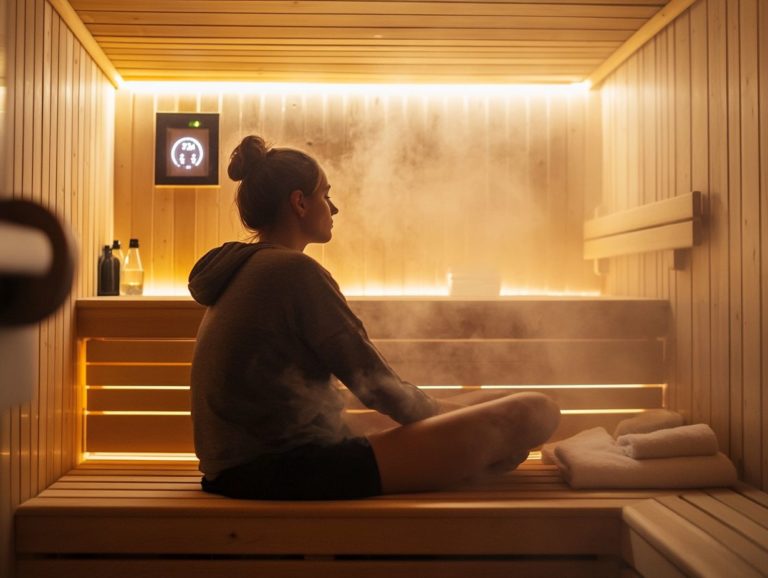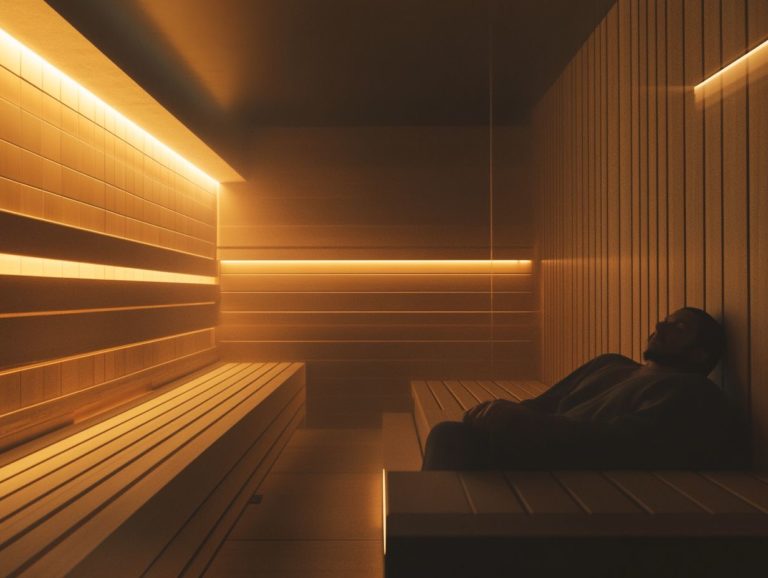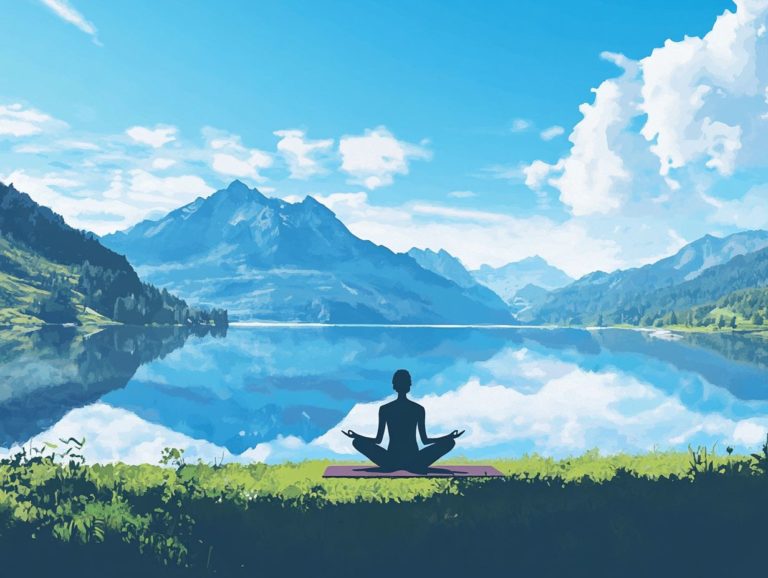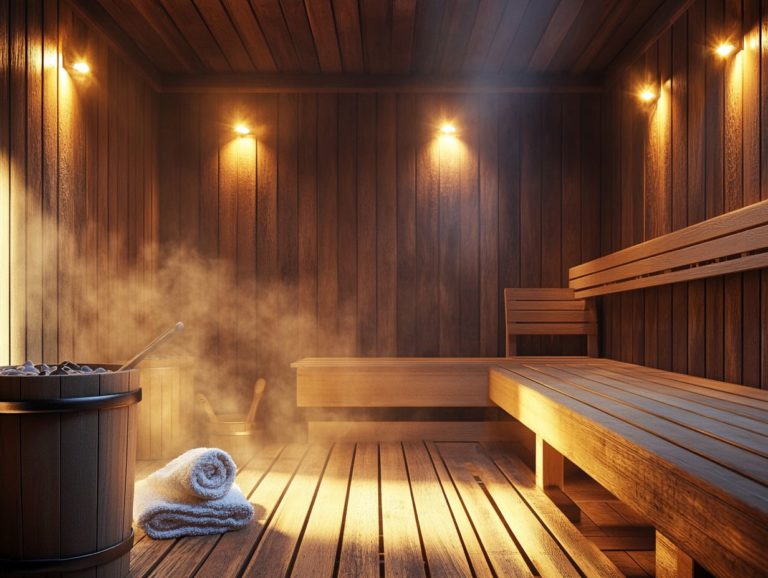5 Relaxation Methods to Reduce Anxiety
Feeling overwhelmed by daily stressors can weigh heavily on both your mind and body. Adding relaxation techniques to your daily life offers a powerful antidote to anxiety.
This article delves into five effective methods, ranging from deep breathing exercises to mindful meditation, all designed to help you restore your inner calm.
It highlights the numerous benefits of relaxation and provides practical tips for seamlessly incorporating these techniques into your life. Whether you re a beginner or seeking to elevate your practice, you ll find valuable insights tailored just for you.
Contents
- Key Takeaways:
- 1. Practice Deep Breathing
- 2. Try Progressive Muscle Relaxation
- 3. Engage in Mindful Meditation
- 4. Listen to Soothing Music
- 5. Practice Yoga or Tai Chi
- How Does Relaxation Help with Anxiety?
- What Are the Physical and Mental Benefits of Relaxation?
- How Often Should One Practice Relaxation Techniques?
- What Are Some Other Ways to Incorporate Relaxation into Daily Life?
- What Are the Potential Risks or Side Effects of Relaxation Techniques?
- What Are Some Tips for Finding the Right Relaxation Method for You?
- Frequently Asked Questions
- What are the benefits of using relaxation methods to reduce anxiety?
- What are the 5 relaxation methods to reduce anxiety?
- How does deep breathing help with anxiety?
- Can I practice relaxation methods anywhere?
- Do I need any special equipment to practice relaxation methods?
- Are relaxation methods a substitute for therapy or medication?
Key Takeaways:
- Deep breathing can quickly melt away stress by slowing down your heart rate and calming your mind.
- Progressive muscle relaxation involves tensing and relaxing different muscle groups to release tension and promote relaxation.
- Mindful meditation helps reduce anxiety by increasing self-awareness and promoting a sense of calm through simple exercises that focus on the present moment.
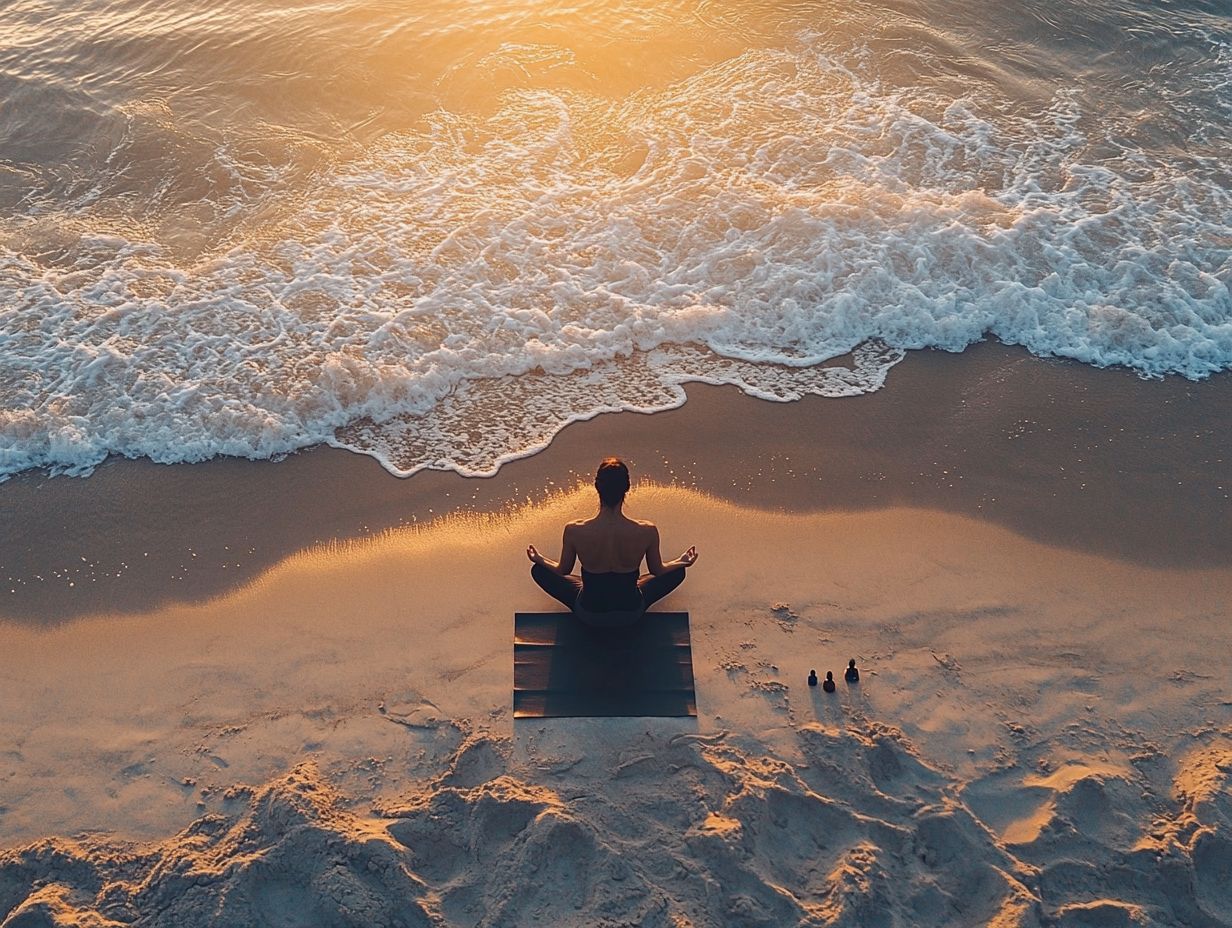
1. Practice Deep Breathing
Practicing deep breathing is one of the most effective relaxation techniques available, helping to lower your stress levels, manage anxiety, and promote emotional calmness in your daily life. By focusing on controlled breathing, you can activate the relaxation response, which is the body’s way to calm down, effectively mitigating the impact of stress hormones on both your body and mind.
This process, particularly through techniques like diaphragmatic breathing and the 4-7-8 method, allows you to engage in deeper, more deliberate inhalation and exhalation. This promotes optimal oxygen flow and encourages a state of tranquility. Diaphragmatic breathing fully engages your diaphragm, facilitating a more efficient intake of air, while the 4-7-8 method guides you to inhale for four seconds, hold for seven, and exhale for eight, establishing a calming rhythm for your nervous system.
The Mayo Clinic recommends adding these exercises to your daily routine, highlighting their crucial role in stress management and overall mental wellness. Embracing these practices can foster a profound sense of peace and well-being amidst the hectic pace of modern life.
2. Try Progressive Muscle Relaxation
Progressive muscle relaxation is a highly effective technique to help you ease tension and promote muscle relaxation. This method enables you to identify the physical sensations of stress and the relief that follows. By tensing and then relaxing different muscle groups, you can significantly reduce stress and alleviate chronic pain symptoms.
As you systematically work through each area of your body, starting from the feet and moving up to the head or vice versa you’ll learn to pinpoint where tension tends to linger. Begin with a deep breath, tense a specific muscle group for several seconds, and then gradually release that tension while focusing on the sensation of relaxation. This practice sharpens your body awareness and cultivates emotional calmness, enabling you to handle high-stress situations with greater ease.
With consistent incorporation of this technique into your daily routine, you’ll enjoy enhanced overall well-being and build resilience against stress.
3. Engage in Mindful Meditation
Engaging in mindfulness meditation nurtures your mental health and emotional well-being, providing a powerful tool to manage anxiety and emotional discomfort while promoting relaxation. This practice invites you to immerse yourself in the present moment, effectively minimizing stress and enriching your overall quality of life.
To elevate your mindfulness journey, consider exploring techniques such as guided imagery and self-hypnosis, both of which can seamlessly blend into your daily routine. By visualizing serene landscapes or desirable outcomes, guided imagery helps you harness your imagination, fostering a profound sense of peace. Conversely, self-hypnosis enables you to enter a state of heightened awareness, where you can reinforce positive habits and perspectives.
Numerous studies, including research from the Mayo Clinic, indicate that regular mindfulness meditation significantly reduces stress levels. This makes a compelling case for integrating these practices into your life. These methods not only enhance your productivity but also contribute to sustainable mental wellness over time.
4. Listen to Soothing Music
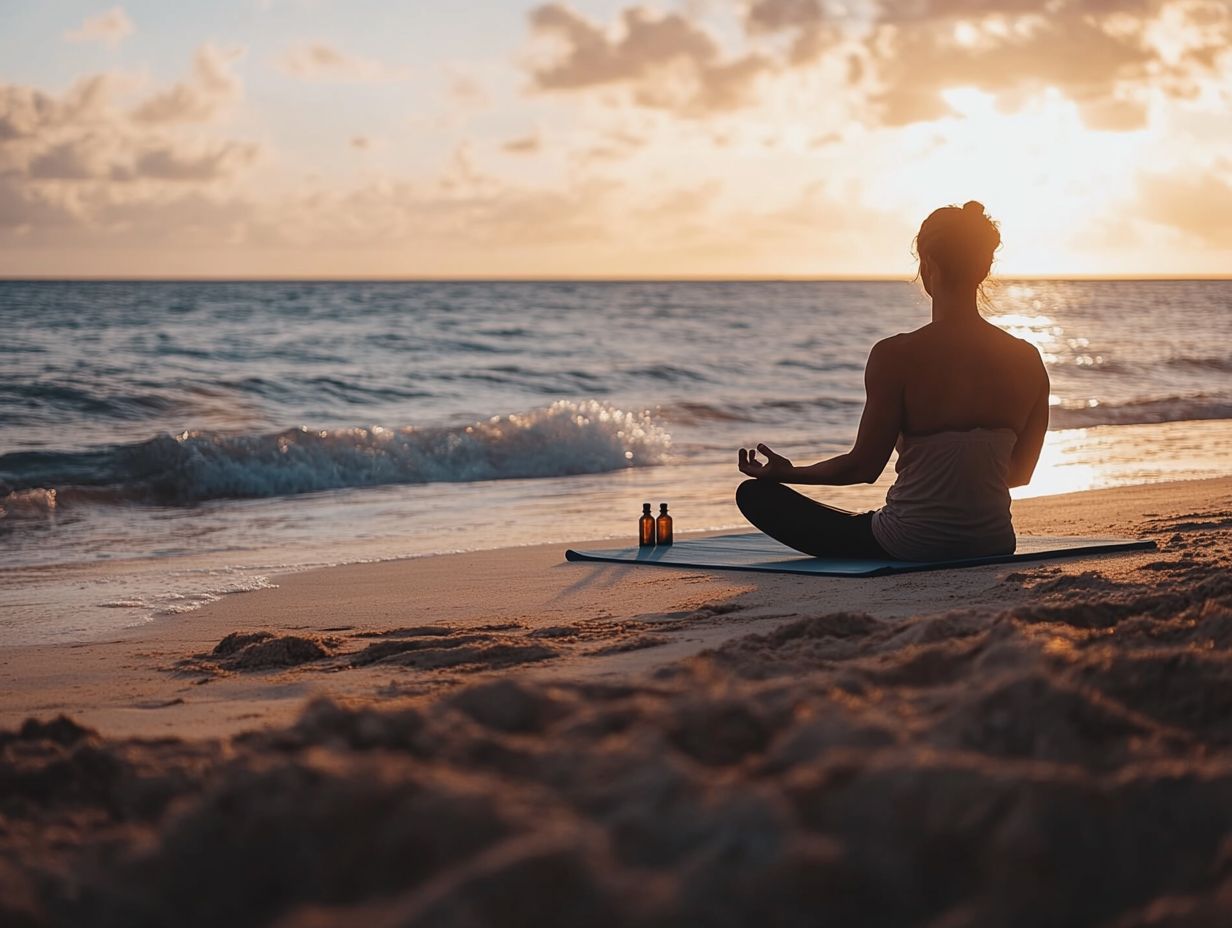
Listening to soothing music can be an incredibly effective relaxation technique. It helps lower stress levels and cultivate emotional calmness on your wellness journey. Music therapy has shown its ability to reduce stress symptoms and promote relaxation, making it an invaluable tool for managing stress.
The science behind this phenomenon reveals that music can profoundly influence how your brain works, reducing stress hormones like the stress hormone while elevating feel-good neurotransmitters such as dopamine. This explains why genres like classical, ambient, or soft jazz are especially effective; they create an auditory environment that invites tranquility.
Create personalized playlists today to harness the power of soothing music! Curate playlists that reflect your tastes by incorporating your favorite calming tracks. Engaging with music that resonates with you emotionally can significantly enhance your mental health, providing an accessible and delightful way to combat everyday stressors.
5. Practice Yoga or Tai Chi
Ready to boost your physical fitness? Practicing yoga or Tai Chi can transform your mind and body! Not only do these practices enhance your stress management, but they also contribute to your overall emotional and physical well-being. These mindful exercises improve flexibility and body awareness. They help you connect with yourself and lower stress levels.
Incorporating these practices into your daily routine can significantly improve digestion. The gentle movements stimulate your digestive organs, making nutrient absorption more efficient. Many practitioners report enhanced sleep quality due to the calming effects these exercises have on the nervous system.
If you’re a beginner eager to embark on this journey, starting with simple poses or basic Tai Chi movements can make a remarkable difference. Numerous online classes cater to various skill levels, offering guided sessions that can foster your personal growth and development in these holistic practices.
How Does Relaxation Help with Anxiety?
Relaxation techniques are essential for managing anxiety. They work to counteract the effects of stress hormones while promoting mental wellness and fostering a more balanced emotional state. By incorporating methods such as deep breathing, mindfulness meditation, and progressive muscle relaxation a technique to relax your muscles one by one you can effectively diminish anxiety symptoms and enhance your overall quality of life.
These techniques are not just about relaxation; they also help lower heart rates and blood pressure. This cultivates a sense of calm that sharpens your focus and emotional clarity. Make them a regular part of your routine to effortlessly integrate them into your morning rituals or evening wind-downs.
Over time, you may find a newfound resilience against stress, leading to a noticeable reduction in anxiety levels. These practices also offer long-term benefits that extend beyond fleeting relief from anxiety. They pave the way for substantial improvement in your mental well-being, equipping you with valuable tools to navigate life’s challenges with greater ease and confidence.
What Are the Physical and Mental Benefits of Relaxation?
The physical and mental benefits of relaxation are truly remarkable, providing you with improved stress relief, reduced symptoms of chronic pain, and enhanced emotional well-being. By embracing relaxation techniques such as yoga, meditation, and deep breathing, you can experience a holistic uplift in your quality of life and overall health.
These practices not only lower blood pressure and improve digestive health, but they also create pathways for effective pain management, reducing your reliance on medications. Mentally, relaxation sharpens your focus and clarity, enabling you to tackle daily tasks with greater productivity.
It cultivates an emotional sanctuary that nurtures calmness, equipping you with resilience against stress and anxiety. This leads you to a more balanced and fulfilling life. As you weave these techniques into your routine, you ll likely discover yourself navigating challenges with newfound grace and ease. Start your journey to better mental health now and transform both your physical and emotional landscapes for the better!
How Often Should One Practice Relaxation Techniques?
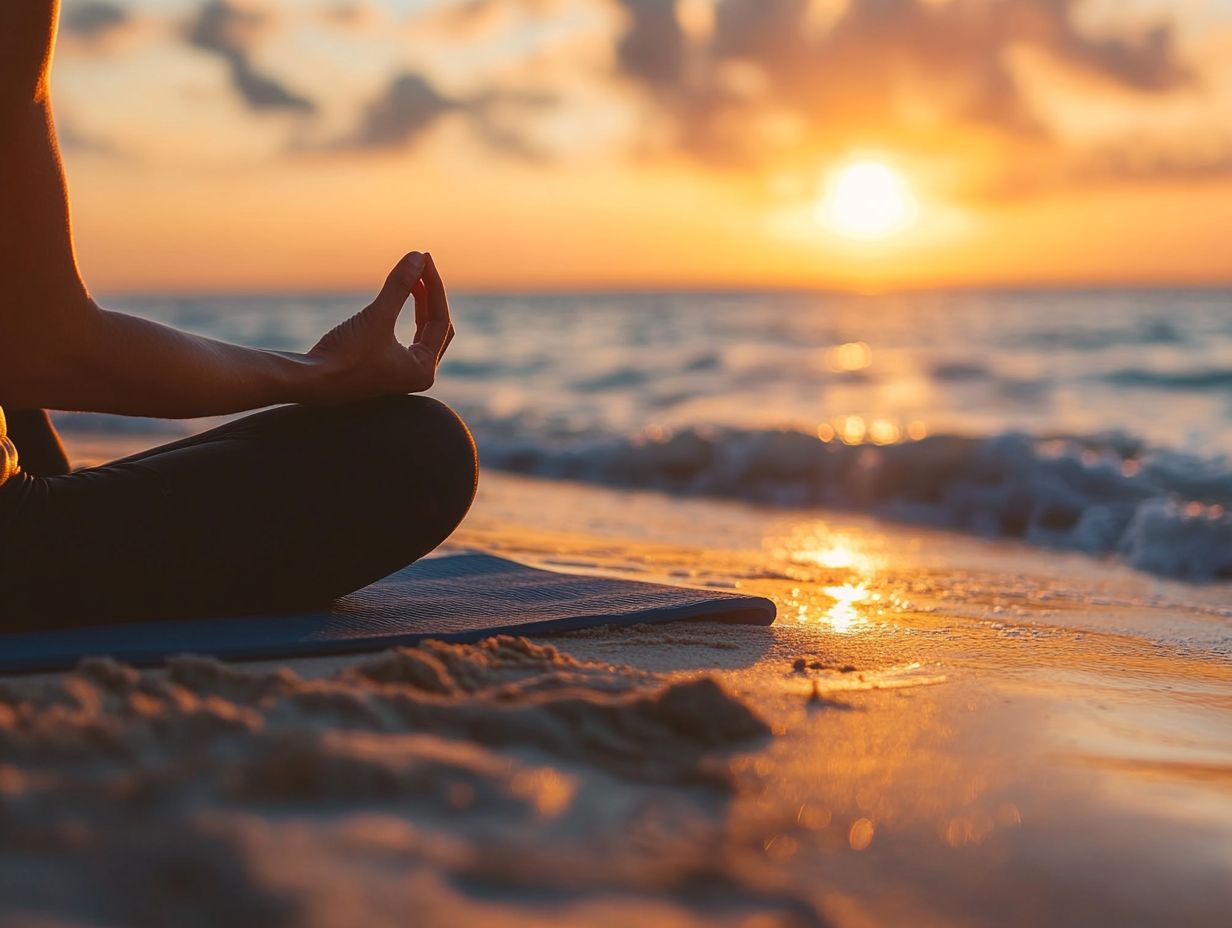
To reap the maximum benefits, practice relaxation techniques regularly. Ideally, weave them into your daily routine to boost your mental wellness and manage stress effectively. Consistent practice cultivates familiarity, allowing your body and mind to respond more readily to stressors.
Start with daily deep breathing exercises. These can be simple yet powerful. Just a few minutes each morning can help center your mind. Set aside time each week for yoga or meditation to enhance your flexibility and mental clarity.
It’s important to remember that everyone’s needs are unique. Some people may prefer practicing more often, while others may enjoy a lighter touch. Experimenting with various frequencies can lead you to a personalized routine that resonates with your lifestyle, promoting a sustainable practice that genuinely enhances your well-being.
What Are Some Other Ways to Incorporate Relaxation into Daily Life?
Incorporating relaxation techniques into your daily life can be seamless and beneficial for your wellness journey. Simple practices like taking short breaks for deep breathing, being aware of your thoughts and feelings during everyday tasks, or spending quality time with supportive friends can significantly elevate your relaxation experience.
Transform mealtimes into a calming ritual through mindful eating. Savor every bite and truly appreciate your food. You can also explore sensory relaxation exercises, focusing on the feel of different textures or the sounds surrounding you, which can envelop you in a cocoon of tranquility.
If sitting still feels challenging, incorporate regular movement breaks. Try stretching or taking short walks to invigorate both your body and mind. By experimenting with various coping methods, you can uncover what resonates with you, fostering a more balanced and serene lifestyle.
What Are the Potential Risks or Side Effects of Relaxation Techniques?
While relaxation techniques offer many benefits, it’s crucial to be mindful of potential risks or side effects. These may include fleeting physical sensations or emotional discomfort in certain individuals. Understanding these risks allows you to practice wisely and adapt your techniques as needed.
For example, in mindfulness practices, you might grapple with heightened anxiety, especially if facing uncomfortable thoughts. If you’re new to yoga or pushing your limits too quickly, you may experience muscle soreness.
Stay in tune with your body, recognizing any adverse reactions and adjusting your approach. Consulting with professionals can provide tailored guidance, ensuring that you navigate challenges associated with these relaxation methods while still enjoying their rewards.
What Are Some Tips for Finding the Right Relaxation Method for You?
Finding the right relaxation method is a personal journey that often requires some trial and error. This process helps you discover techniques that truly resonate with your mental health and emotional needs.
Keep an open mind as you explore. Try practices like deep breathing, guided meditation, or yoga. Reflecting in a journal about how each method affects your mood and stress levels can yield valuable insights.
Remember, not every technique works for everyone. Tailor your relaxation practices to fit your unique preferences and lifestyle. Whether you find peace in nature walks or prefer more structured programs, adopting a reflective approach ensures your journey toward improved well-being is both fulfilling and effective.
Frequently Asked Questions
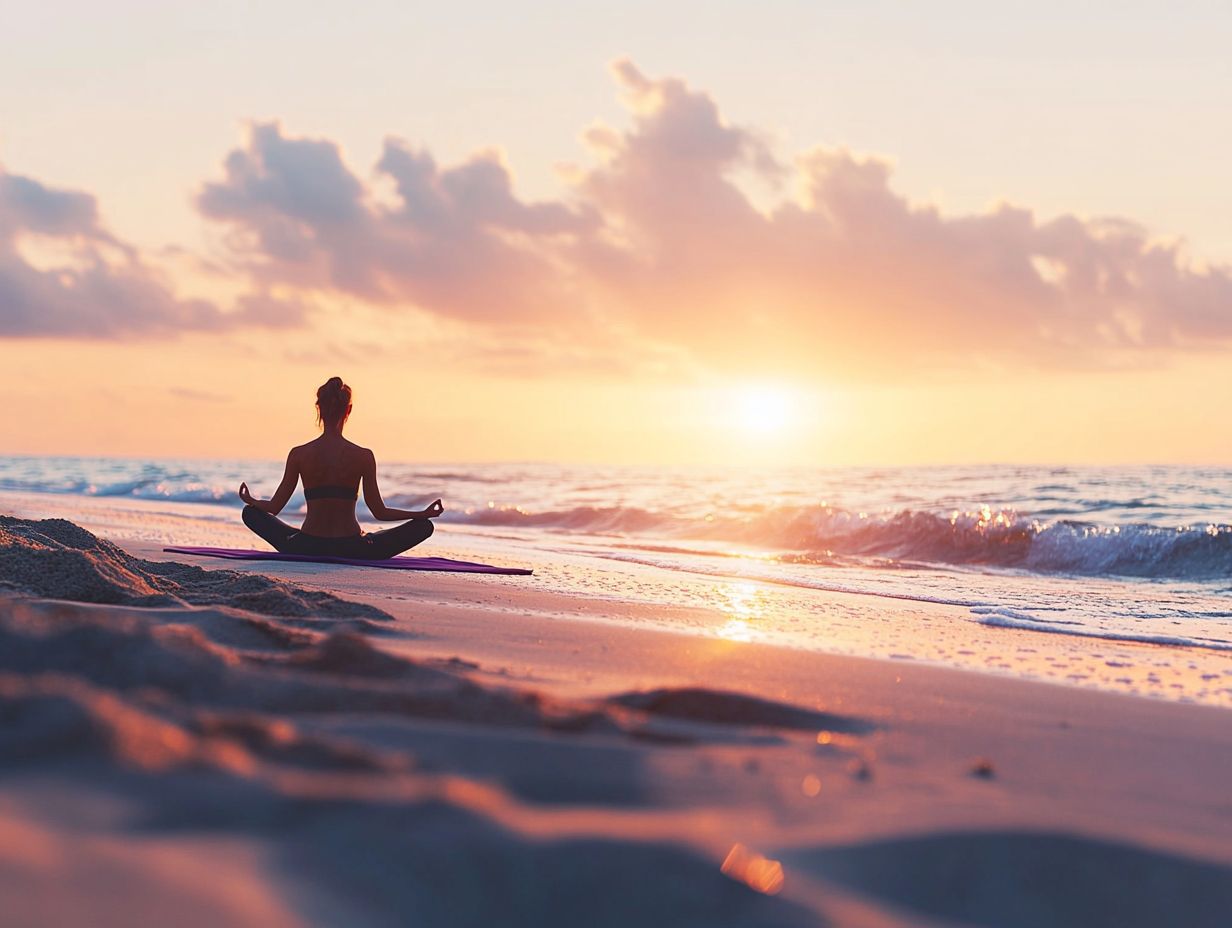
What are the benefits of using relaxation methods to reduce anxiety?
Relaxation methods decrease stress and promote relaxation. They can also improve your sleep and reduce anxiety symptoms.
What are the 5 relaxation methods to reduce anxiety?
The five methods include deep breathing, tensing and relaxing your muscles, meditation, visualizing calming scenes, and yoga.
How does deep breathing help with anxiety?
Deep breathing slows your heart rate and decreases muscle tension. This promotes relaxation, helping to alleviate anxiety symptoms.
Can I practice relaxation methods anywhere?
You can practice relaxation methods anywhere. Feel free to do them at home, work, or even in public spaces!
Do I need any special equipment to practice relaxation methods?
No special equipment is necessary. You can use just your body and modify the methods to fit your needs and preferences.
Are relaxation methods a substitute for therapy or medication?
You can supercharge your anxiety relief with relaxation methods alongside therapy and medication! Consult a healthcare professional today to create your perfect anxiety management plan!



